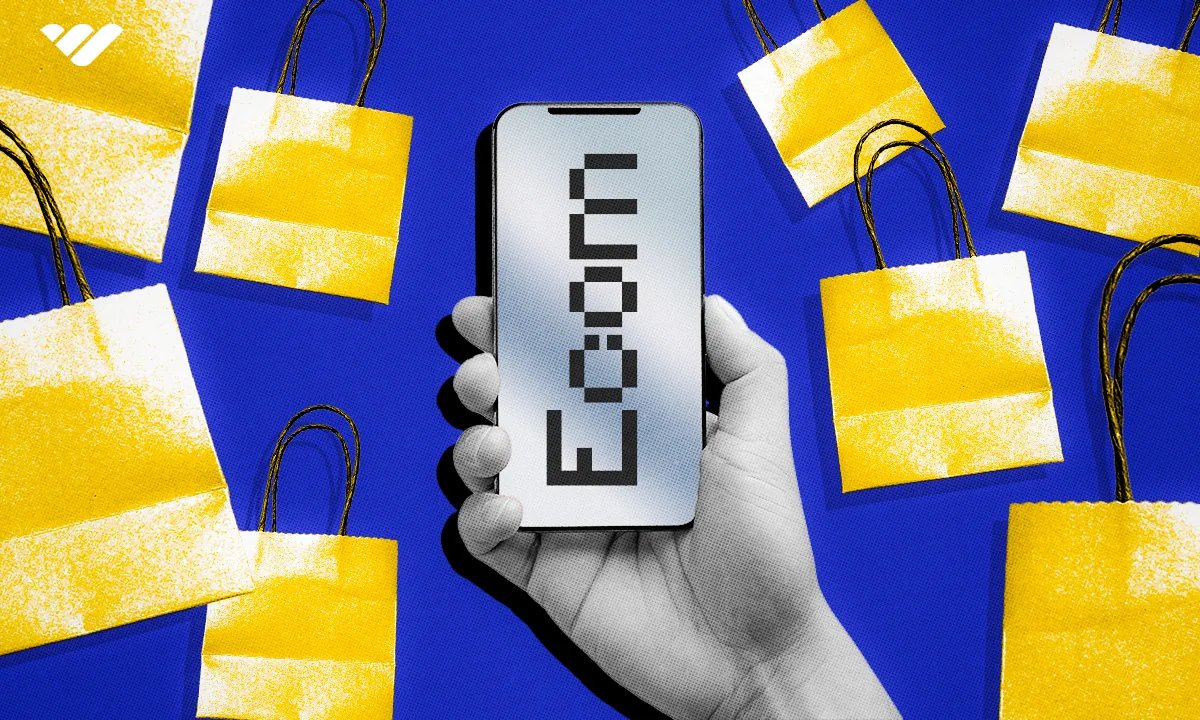In this post, we’ll explore 25 sites and marketplaces for selling things online, why you should consider online marketplaces, and how they help you reach a broader audience.
Key takeaways
- You can sell online without owning your own store by leveraging existing marketplaces with built-in audiences.
- Different platforms specialize in different products—choose based on what you sell and your fee tolerance.
- Fee structures vary widely across platforms, from percentage-based commissions to monthly subscriptions.
If you’re considering starting your own business selling goods online, you might wonder where to find customers for your products.
Selling goods via the internet can be an incredibly lucrative business model, with the ecommerce space seeing massive growth in the past few years. One of the biggest reasons for this upsurge is that customers find it extremely convenient to buy things from the comfort of their couch without going outside.
The best thing about selling online is you don’t need to own an online store to sell online. There are several online marketplaces, such as Walmart, Amazon, eBay, Etsy, etc., with a massive pool of existing customers ready to purchase your products.
In this post, we’ll explore 25 sites and marketplaces for selling things online, why you should consider online marketplaces, and how they help you reach a broader audience.
23 Sites & Marketplaces for Selling Things Online
There are plenty of online marketplaces where you can sell your goods to a global audience and scale your business. Here are 23 sites and marketplaces you should consider when selling your goods online.
1. Whop: The best marketplace for digital products and services
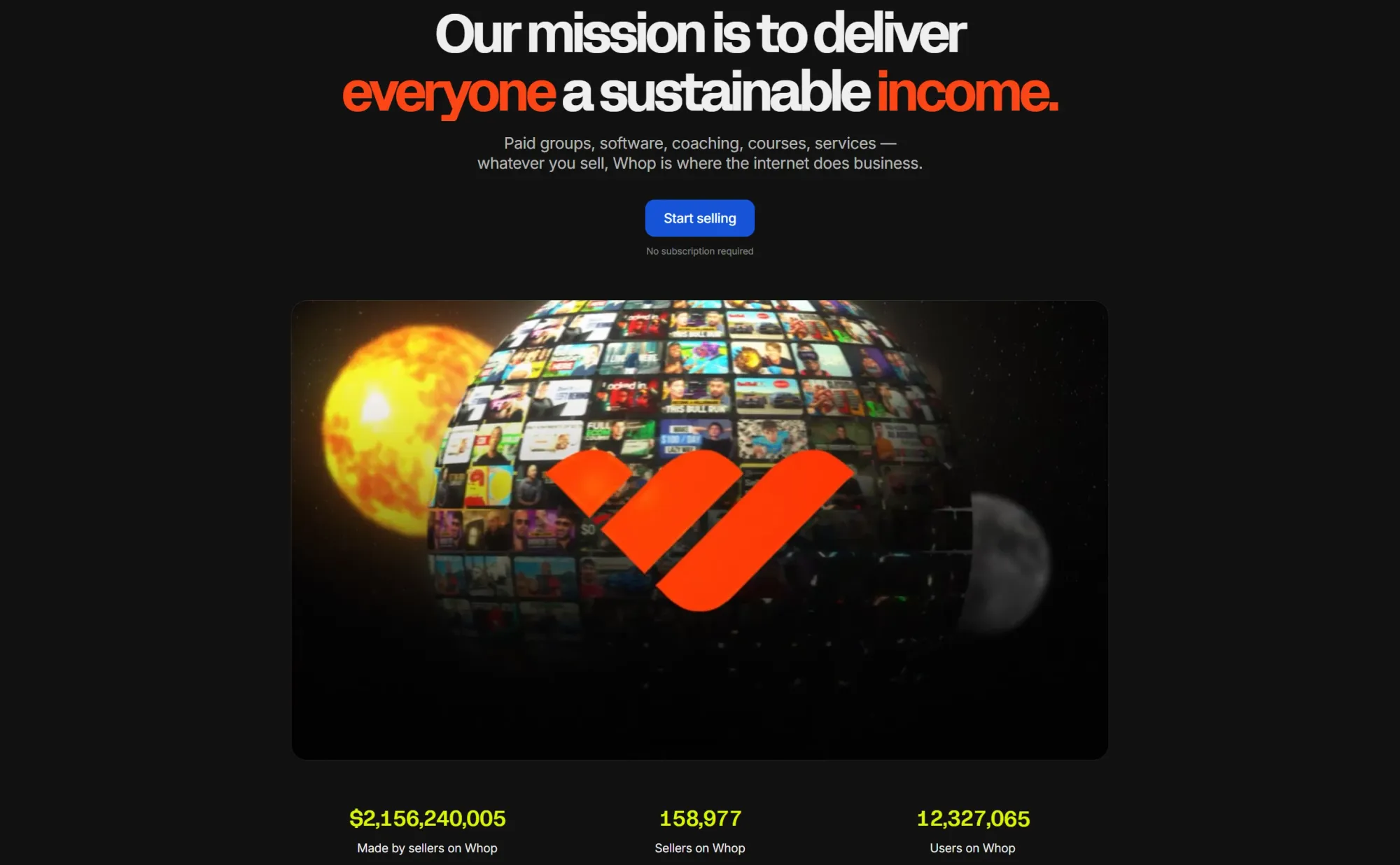
Digital products are becoming more and more popular, with the volume of digital product transactions increasing by almost 70% in the last 2 years. The biggest decision for creators of digital products is where to sell them!
Are you a course or content creator or a digital marketer trying to monetize your skills? Perhaps you have created a paid online community, or an ebook. Maybe you want to sell software or webinars. Whether you're selling an online service for a recurring subscription fee or offering digital downloads for one-off payments, Whop is the platform for you.
Whop is an all-in-one platform that has an online marketplace created exclusively for digital products, and is home to the likes of Alex Sedlak and Musa Mustafa.
As a buyer, you can browse the marketplace, check out the reviews, and choose the right product for you. As a creator, you make your own whop using a simple no-code builder, then price your products, set up your payment systems and let Whop take care of the rest.
Whop offers a wide range of features that help people build and grow their digital businesses, like email marketing, feedback collection, various integration options, affiliate marketing, and an API.
Plus, there are no monthly fees, and Whop's commission starts at just 2.7% + $0.30.
2. Amazon

Amazon is one of the biggest and most trusted marketplaces, selling over 400 products per minute. But how does it achieve such a feat? By establishing trust and a sense of comfort among the site's buyers.
Amazon verifies sellers and keeps counterfeit products off its site. This has helped it gain people's trust and ensure customers get exactly what they ordered. This resulted in Amazon becoming the go-to marketplace for online shopping for most customers.
Along with these great benefits come more fees. For a professional selling account, you’ll have an application process coupled with a $39.99 monthly fee.
However, if you’re planning to sell 40 items per month, you can get an individual seller account that doesn’t have any monthly fee. It charges ¢99 per item coupled with percentage fees depending on the category in which you’re selling. It’s a great platform for anyone who’s planning on selling a large number of products or wants exposure from a large audience.
Recommended next read: How you can make money with Amazon, from selling ebooks to joining the affiliate program
3. Etsy
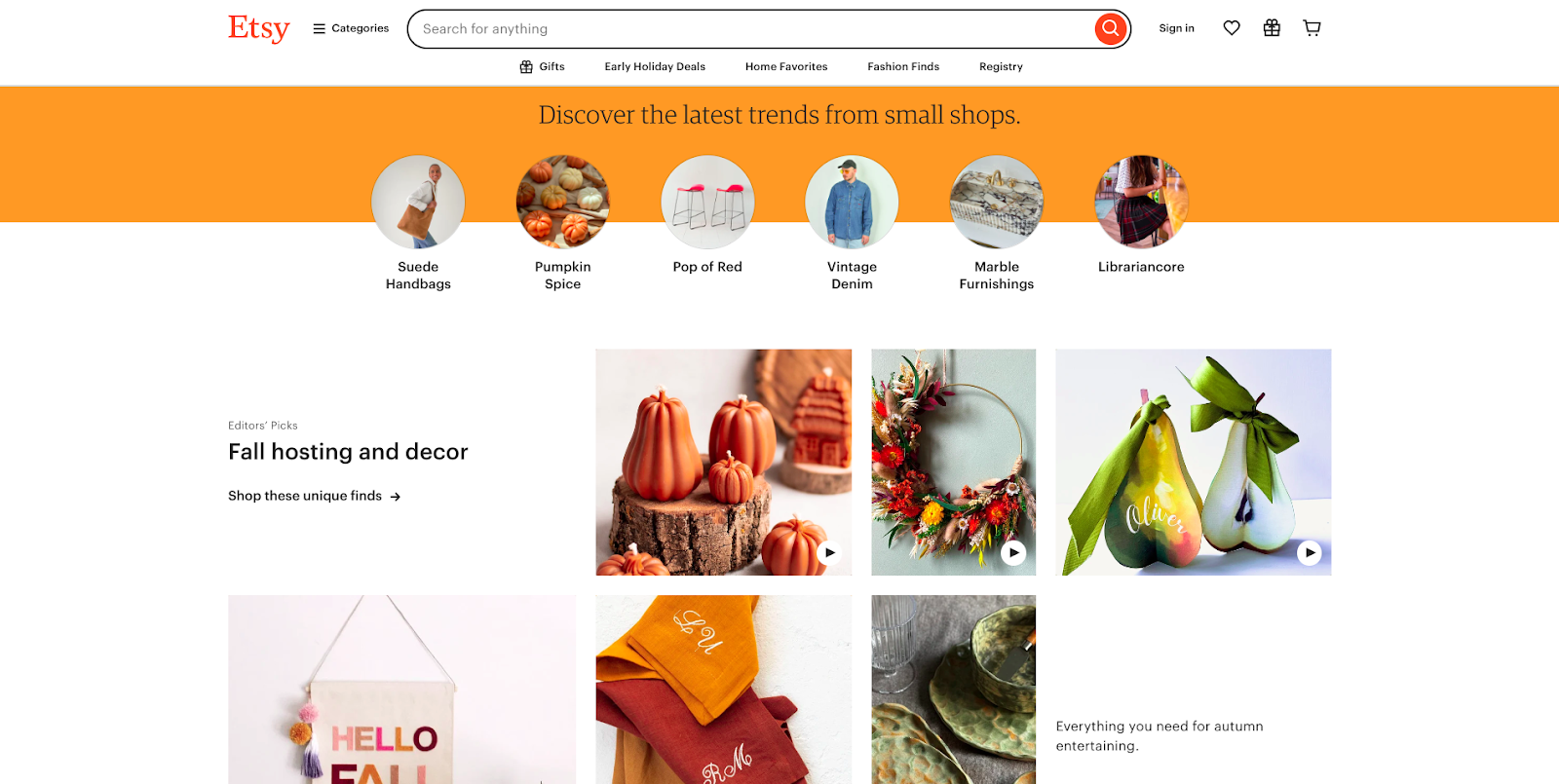
If you’re targeting a niche market, then Etsy should be your platform of choice. It caters to a more niche market than Amazon or eBay. Here, you can sell your art, antiques, collectibles, and handmade goods. Its annual sales hover in the billions, making it an incredibly profitable platform for online sales.
Etsy charges a listing fee of 20¢ for each item. Items can stay on the site for 4 months or till you make a sale. Per item sold, you need to pay a 5% transaction fee and 3% + 25¢ processing fees, which vary based on the seller's bank location.
If you’re selling from the US or Canada, the transaction fees apply to just the listed price and not the sales tax. However, if you want to charge the customers a separate shipping fee, the platform will take 5% of the overall shipping costs.
Etsy’s ease of use and global opportunities for selling your products make it a good choice for starting your online business.
Recommended next read: Is it worth it to sell on Etsy? Everything you need to consider before joining the popular ecommerce platform
4. Decluttr
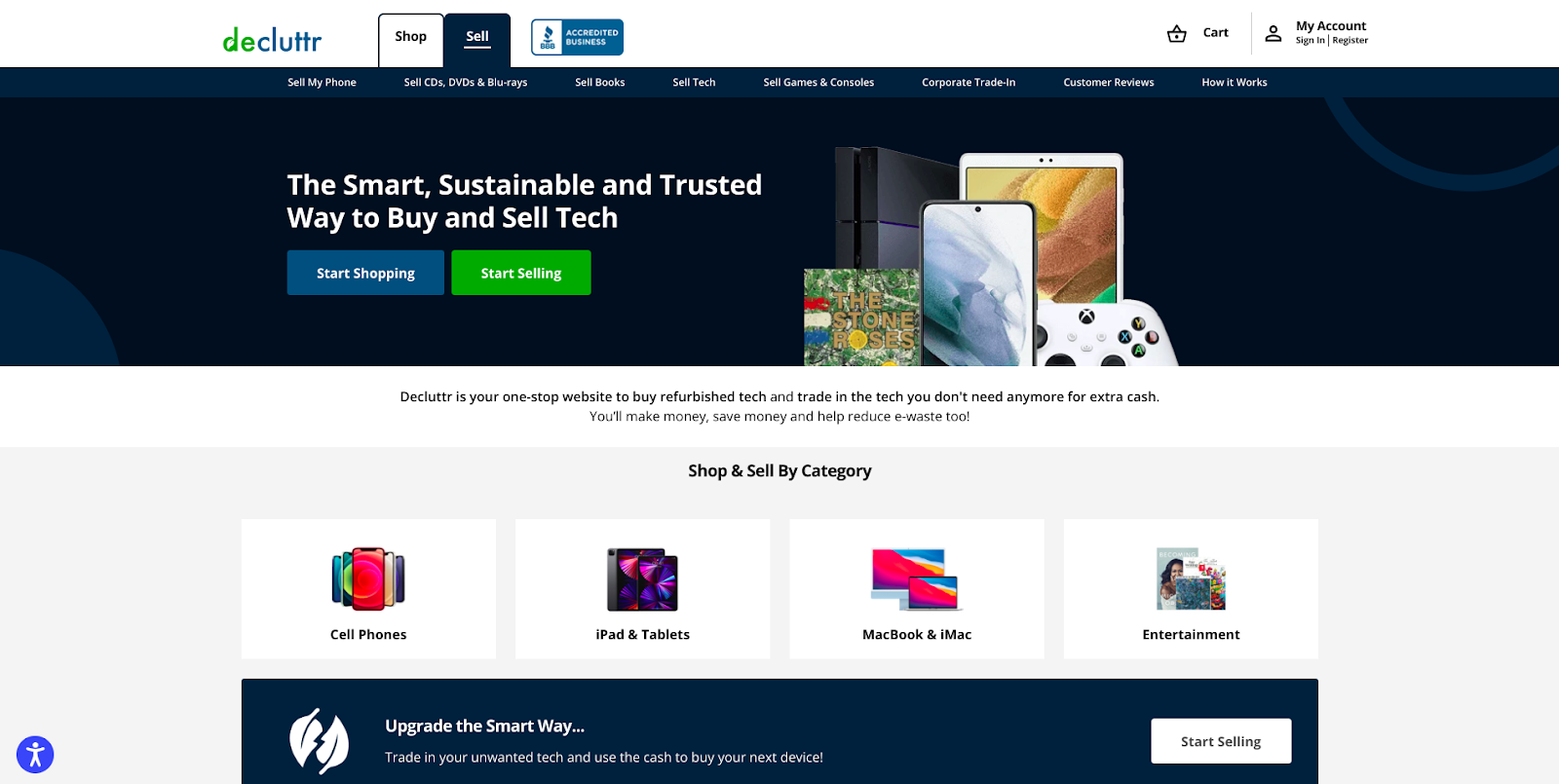
Decluttr is a tech-focused marketplace. It’s your go-to place for selling books, home entertainment items, electronics, and game consoles, and is the best place for electronics. Decluttr’s direct purchase approach sets it apart from other marketplaces.
Rather than listing your products on Decluttr for other customers to buy, Decluttr directly buys items from you. To get a quote, you only need to scan the barcode of your item using its app.
Decluttr has a streamlined and easy-to-use selling process. You don’t have to pay any shipping costs, either. After receiving your items, Decluttr will immediately pay you. So, you’re out of the loop of typical dealings with buyers.
5. eBay
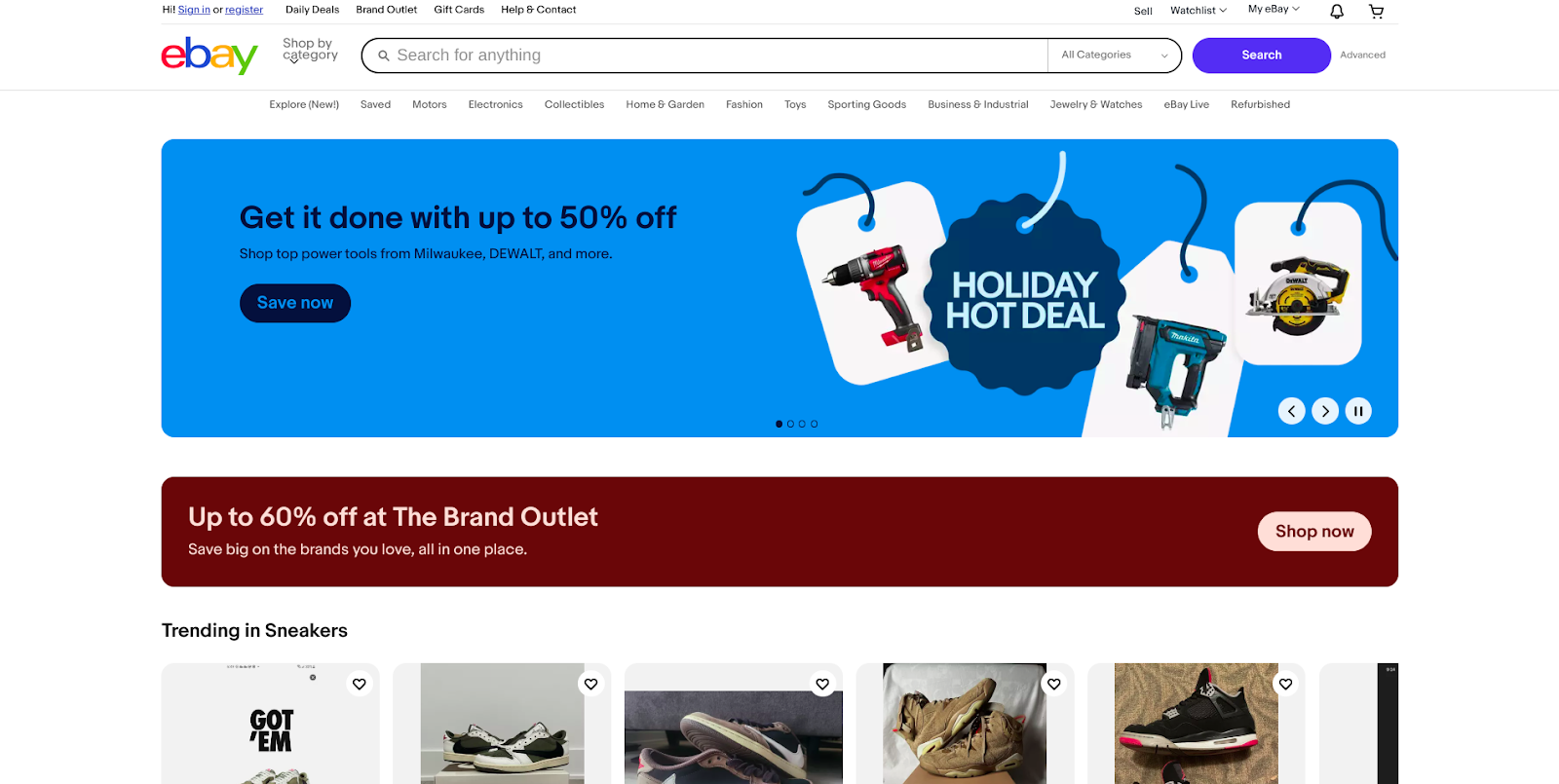
eBay is one of the biggest and oldest ecommerce sites. It’s a global marketplace where you can sell from various countries. With over 1.3 billion listings and 182 million active users, it’s a great place to list your products.
While it was created to sell services and goods, today, it also allows users to host online auctions to sell and buy goods. It provides a great platform to list products and effortlessly sell them to a decent customer base.
eBay hosts products such as electronics, cars, fashion products, jewelry, art, and many more. It also provides seller protection through monitoring, policies, and customer service that ensures a smooth and safe buying and selling experience. You can also schedule when you want to get paid for your sales, such as weekly, biweekly, or monthly.
6. Wish
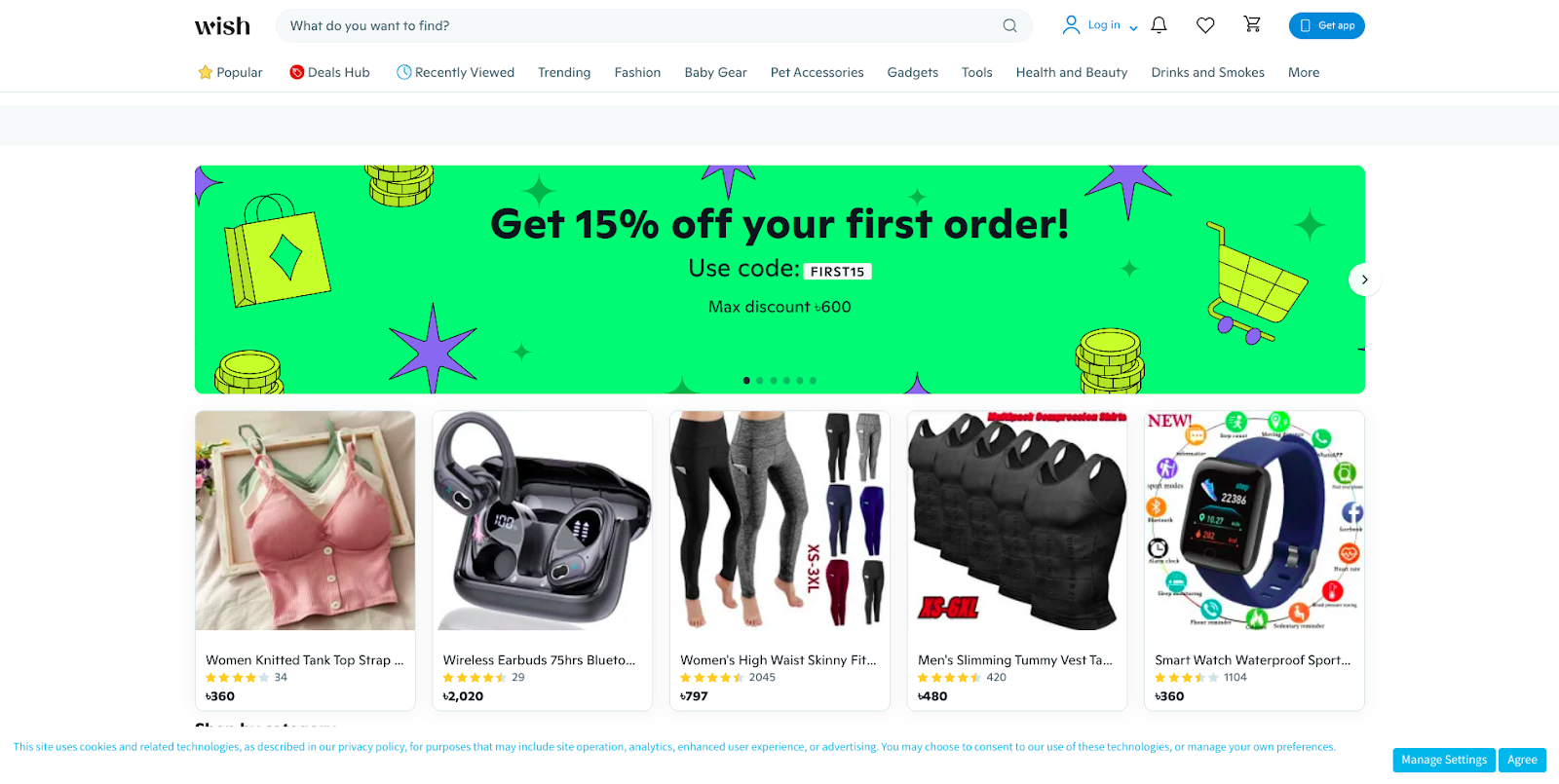
Wish is the best place for customers who are looking for high-quality products at an affordable price. It’s known for its broad range of affordable products. It’s a great platform if you’re looking to sell less popular branded products in bulk. You can sell anything from electronics, fashion products, home improvement tools, and various categories on Wish.
To sell on Wish, you need to fill out their questionnaire and become a merchant. They approve merchants that they find suitable to join their marketplace. If you’re a trusted and reliable seller, then you can become a merchant on Wish.
One thing to remember is that timely shipping is key on Wish. Ensuring reliable shipping options and fast delivery times can significantly boost your visibility on the platform. Track your shipments and update customers regularly to gain and maintain a good seller rating.
7. Shopify
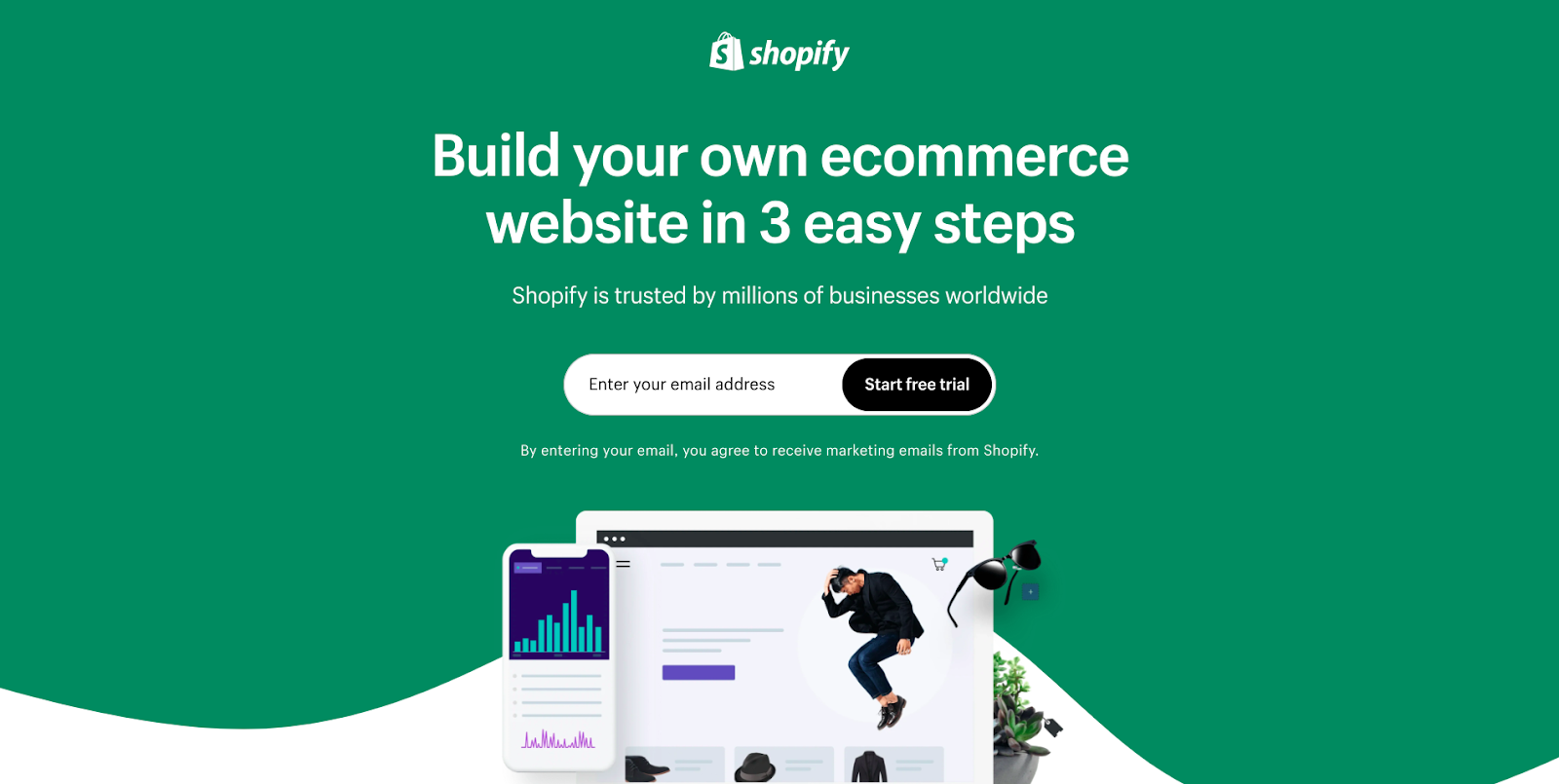
Shopify is one of the biggest ecommerce platforms. It allows you to build your brand identity. Using Shopify, you can build your online store without any coding or backend development. It also acts as an ecommerce platform that provides pre-built online store site themes with fully integrated order fulfillment, payment gateways, and various other apps to run your online store.
You can also integrate chatbots on your Shopify website to enhance the customer experience. It offers a clean and intuitive UI, massive community support, and security, making Shopify a great choice for online sellers. To get the most out of your Shopify site, use Kommunicate to integrate a chatbot.
Recommended next read: The 10 best Shopify alternatives (free and paid)
8. Walmart

Walmart is known as the legend of retail. Sam Walton’s Walmart is also known for offering a broad range of clothing, digital products, electronics, and books at an extremely affordable price. Their marketplace lets anyone start selling their products online.
Walmart also helps its sellers enhance their product visibility and discoverability, like most online ecommerce platforms. They also help fulfill orders and manage payments for their sellers. The unique selling point of Walmart is that they charge zero monthly setup fees.
9. Bonanza
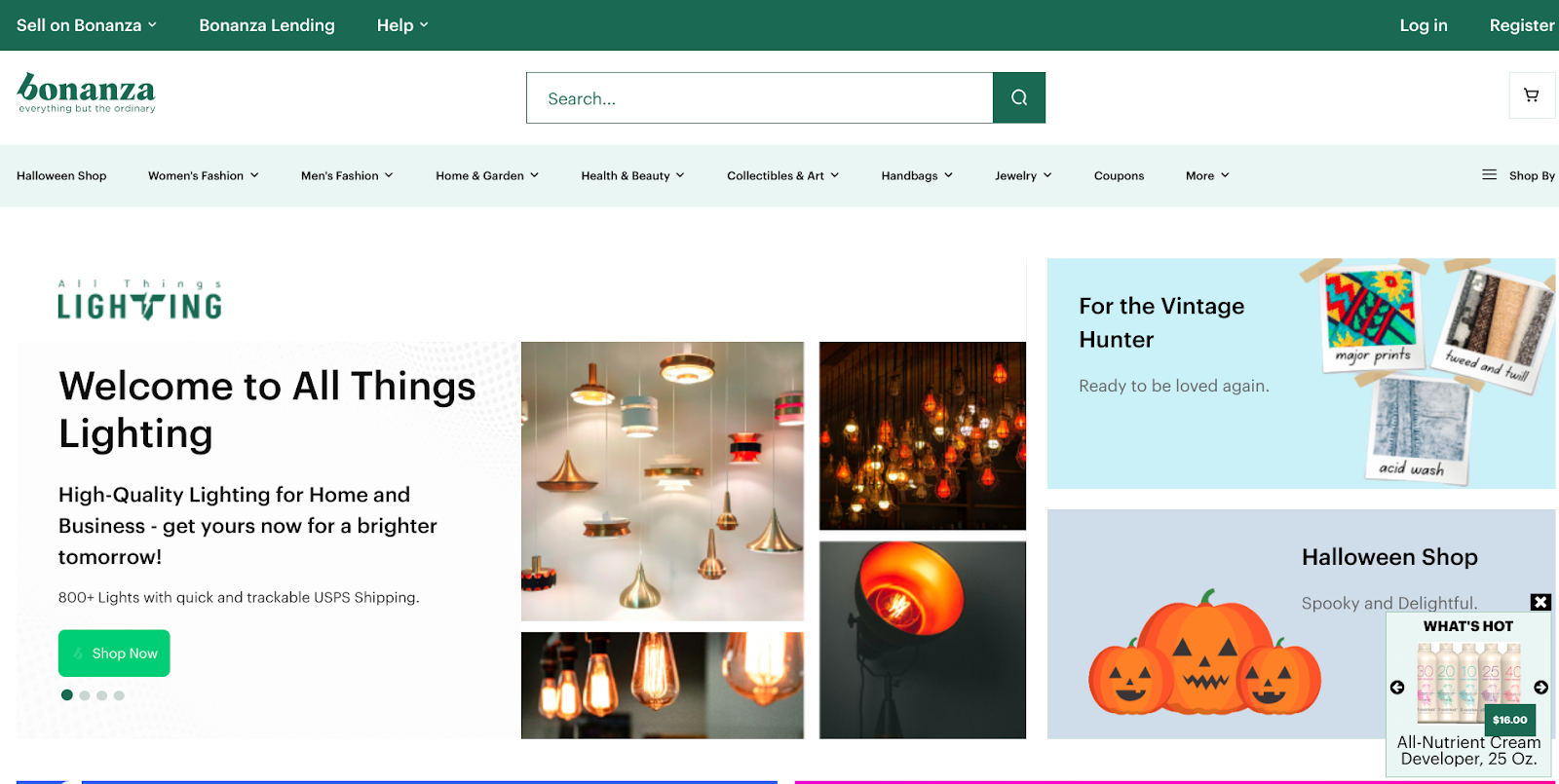
Bonanza is a Seattle-based company that’s comparatively new to the online marketplace game, but they’re still crushing it. Boasting over 35 million different items and 50,000 sellers, Bonanza is a huge and growing community of online shops. They receive over 2 million monthly visitors on their platform.
Bonanza’s fees for selling on its platform are comparatively affordable and based on what they call the “final sale price.” The final sale price is the combined dollar value of the price the buyer paid, along with the portion exceeding $10 over the shipping fees.
For instance, if you sell a product for $20 and $12 shipping, the total price is $22. Their selling fee is 3.5% of the final price, so your fee would come to 77¢. It’s the same for anything you sell over $500; however, you need to pay a 1.5% flat charge for any amount over $500.
This online marketplace is a great option for those who cannot afford listing charges. Setting up your shop is extremely easy, and you only pay if you make a sale. You can even integrate Bonanza with Shopify to sell and manage products effortlessly.
10. Facebook Marketplace
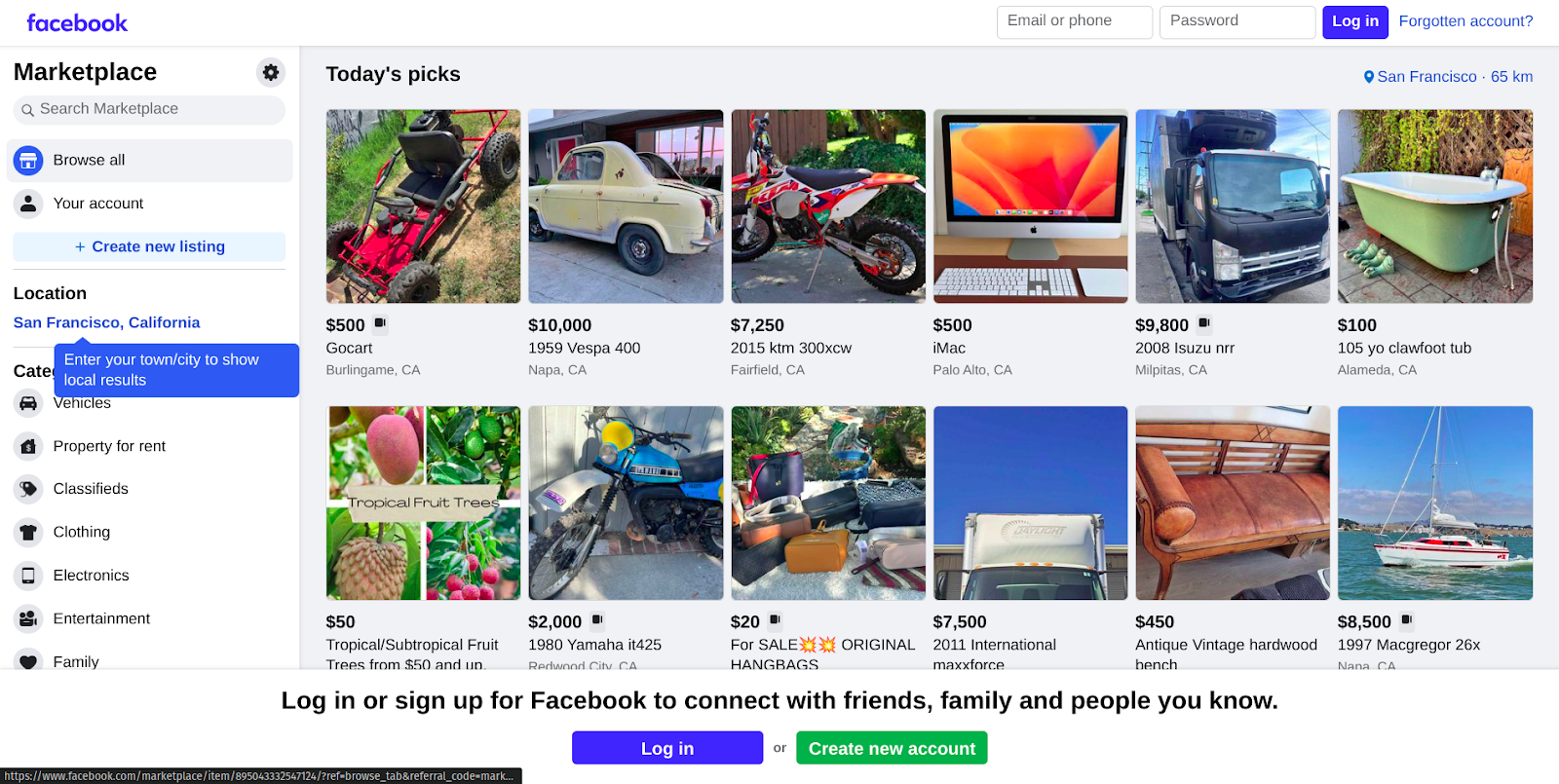
Facebook is one of the most popular social media platforms, and has a marketplace platform to bring communities together to buy and sell goods online. Facebook Marketplace is becoming one of the best online selling sites for local communities. The company is starting to heavily support online merchants.
Users trying to sell their pre-owned goods or vendors trying to sell their products can find potential buyers for their products with relative ease. Thanks to Facebook’s messaging integration, which streamlines buyer-seller communication, it also makes doing background checks easy.
Facebook has partnered with Shopify to help businesses sell their items on Facebook Marketplace. This team-up makes it convenient for Shopify merchants to list and manage their products.
Recommended next read: How to sell on Facebook Marketplace: The what, why, and how of selling with Facebook
11. Craigslist
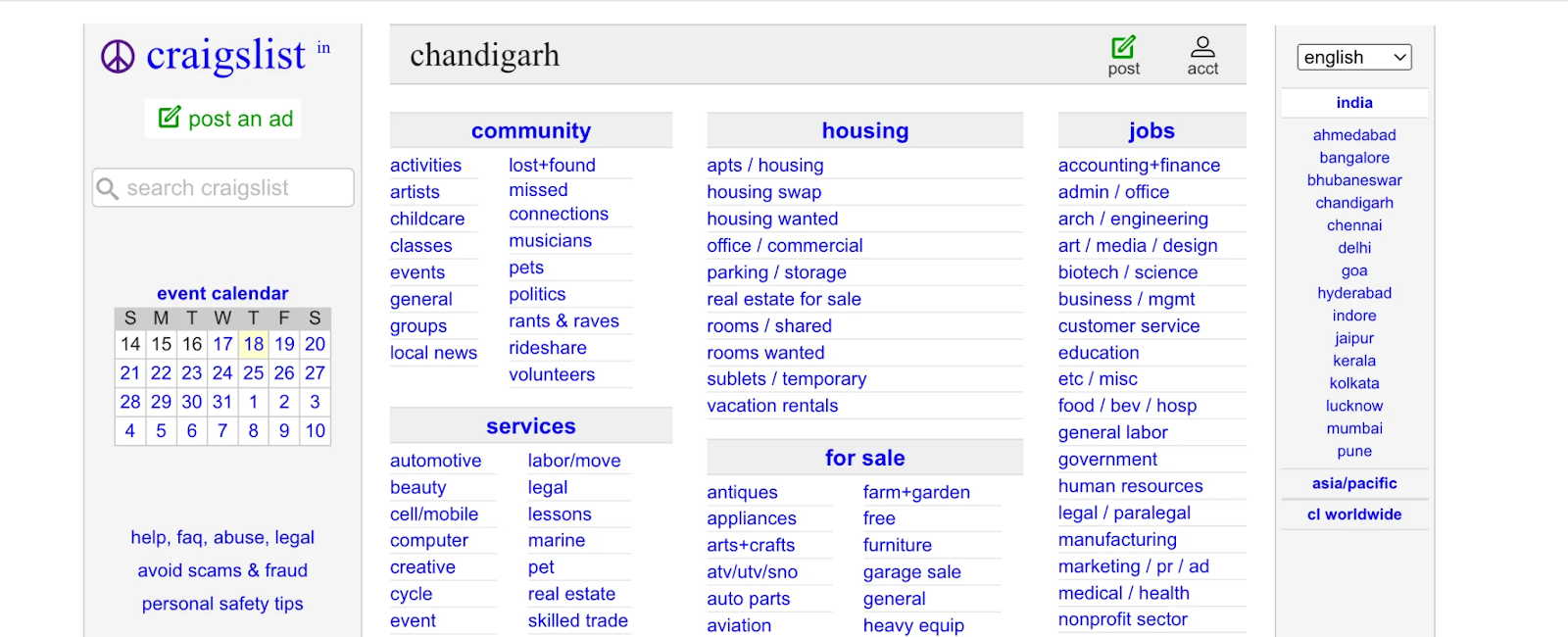
When you think about online marketplaces, the first thing that usually comes to mind is Craigslist. It’s an easy-to-use forum that allows you to list products to sell. This platform has been around forever, more specifically since 1995. It’s also very popular for buying and selling cars. It has listings in 70 different countries.
If you’re looking to sell a car locally, then Craigslist is one of the best online car selling sites. It has come a long way since its forum days. You can create listings with high-quality photos. It’s a stress-free way of selling your car. If you’re selling your car locally, you don’t need to coordinate the logistics of the car payment and transport.
Craigslist doesn’t offer you a national audience like most online marketplaces, meaning it takes longer to sell your car. Location and the model of your car play a big role in how long it might take your car to sell.
However, the downside of Craigslist is that buyers and sellers are not subject to a background check, so meeting strangers online to sell items can be dangerous. Also, Craigslist doesn’t offer any fraud or scam protection for either party.
12. OfferUp
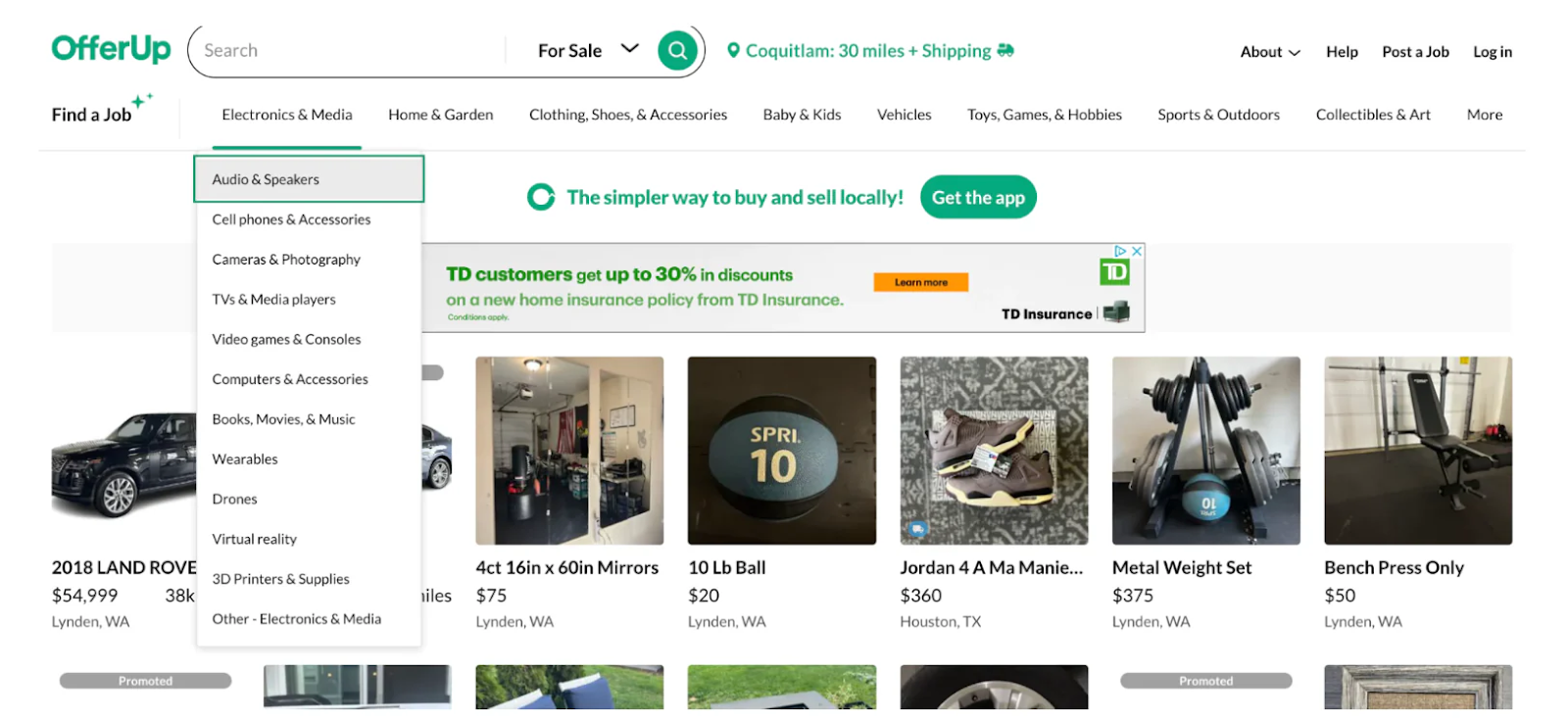
OfferUp is an application that allows merchants to sell various types of products, from clothing and electronics to automobiles. It’s one of the best online selling sites for selling goods locally. You enter a zip code, and the app showcases your listings to potential buyers of your area.
If a potential buyer takes an interest in your item, they can directly message you through OfferUp. From there, you can discuss and arrange a meeting to sell your product.
OfferUp takes the safety of its users very seriously. As a seller, you can check out the profiles and reviews of the buyers before deciding on a meeting. Furthermore, they offer a system that verifies the identities of its users to create a safe environment.
13. Rakuten
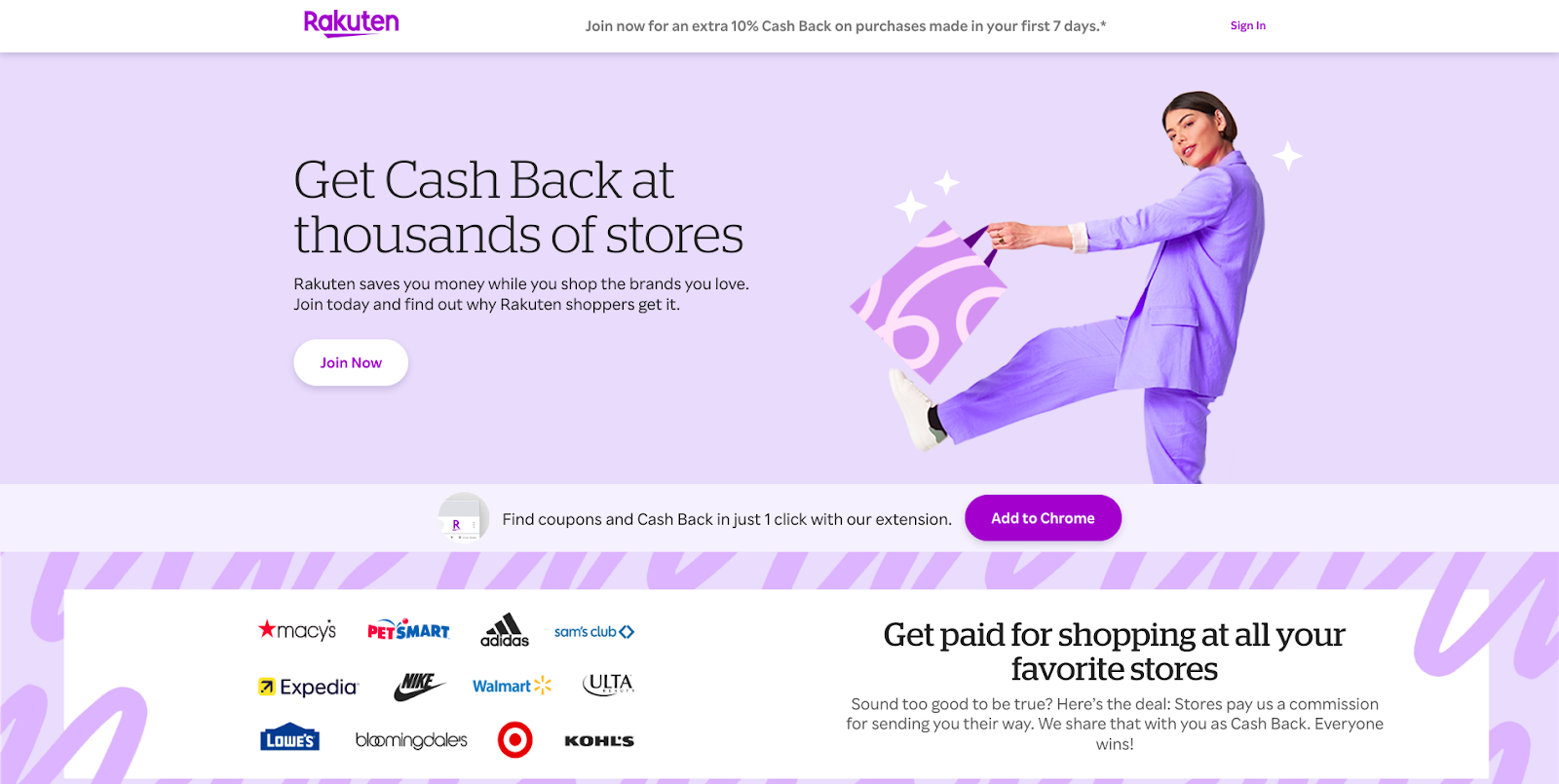
Rakuten is a massive Japanese marketplace with a focus on cross-border ecommerce and over $2.7 billion in revenues. This platform allows you to sell almost anything, from clothing to books, subscription boxes, and sports gear.
It allows businesses to open their online stores on Rakuten. It operates in 10 countries currently. To sell on Rakuten, your business needs to be registered in Japan or the US. Or you can even work with a service partner. Rakuten provides onboarding experts to new sellers to help with the registration, setup, and application procedures.
Rakuten charges a registration fee, system commission, monthly fee, and other charges to allow online sellers to start operations.
14. OTTO
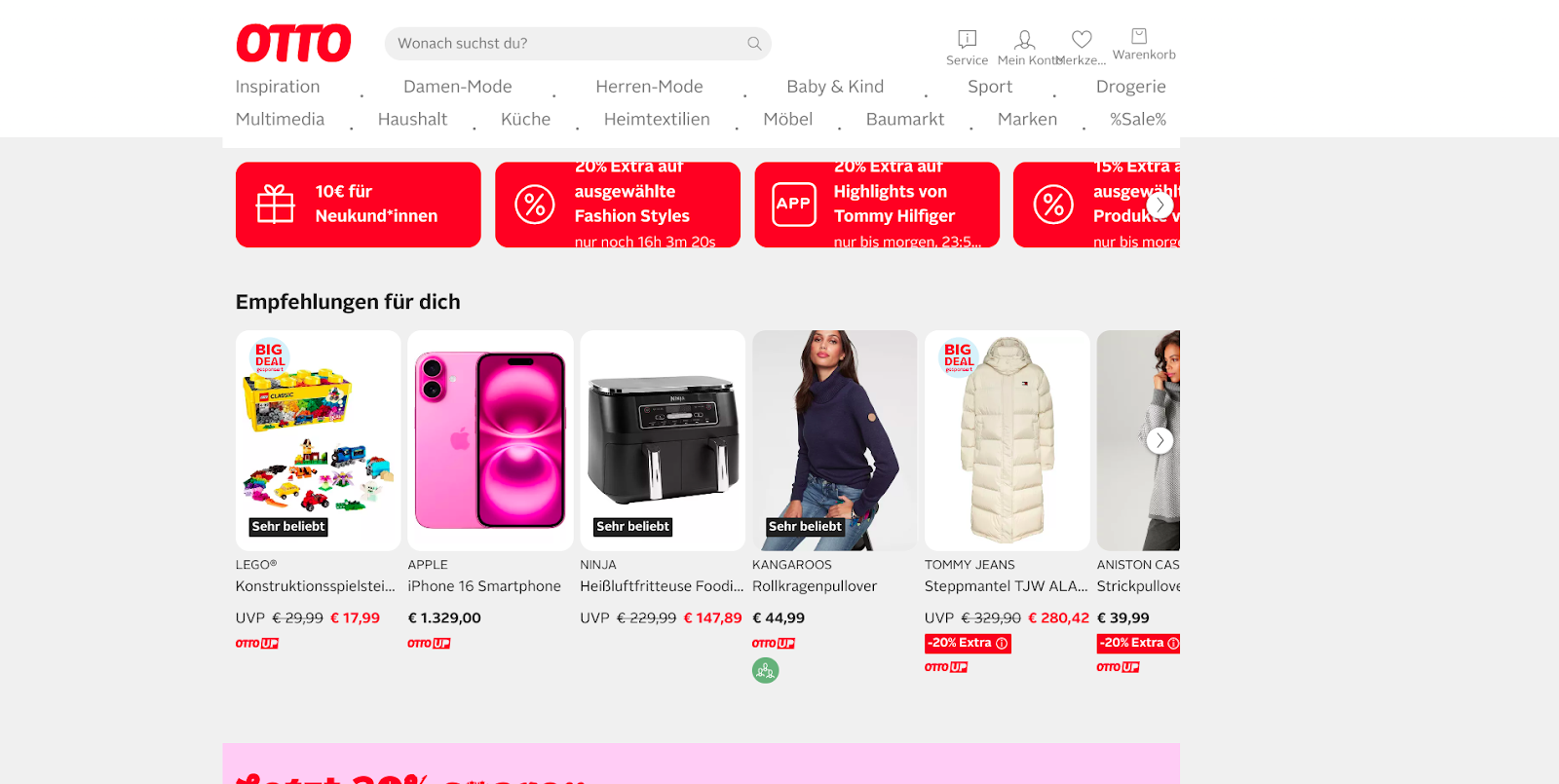
OTTO is a Germany-based marketplace that specializes in fashion and lifestyle products, from branded to third-party retailer goods. This diverse product range attracts a broad clientele.
The biggest advantage of selling OTTO is its low product return rates. This is a huge positive for sellers looking for stable and predictable sales. They also offer affordable options for pay-per-click advertising campaigns. With 11 million active customers, OTTO sells over 90% of its products online.
It also offers sellers competent, fast, and personalized support. For small businesses that are struggling to resolve business issues effectively, this support is invaluable.
15. Flipkart
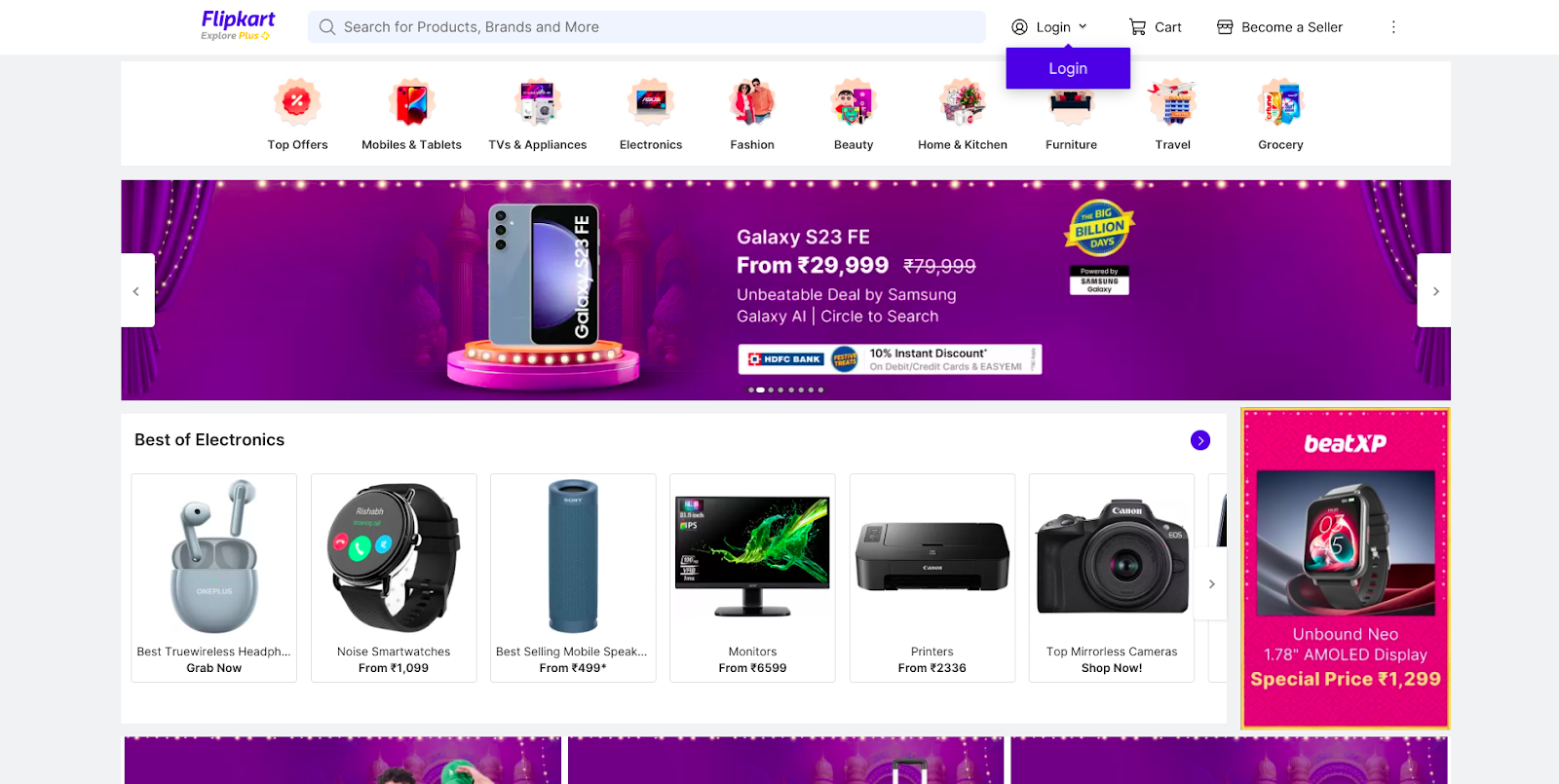
Flipkart started its journey in 2007 as a bookstore and has now turned into one of the biggest online-selling sites in India. It has a wide range of products, including electronics, home essentials, fashion products, lifestyle products, and many more.
For sellers trying to grow their online business in Southeast Asia, Flipkart is the primary choice. It's Amazon India’s main competitor. It appeals to a broad range of customers and has a massive market share in India’s ecommerce market scene.
Flipkart offers immense support to its sellers. It provides professional account management, help with product photoshoots, assistance in cataloging, and more. It also provides a dedicated fulfillment service, making selling logistics streamlined and efficient.
With its flexible payment options, Flipkart makes buying from its platform seamless for users, which creates a loyal customer base. That’s a huge plus for any seller.
16. AliExpress
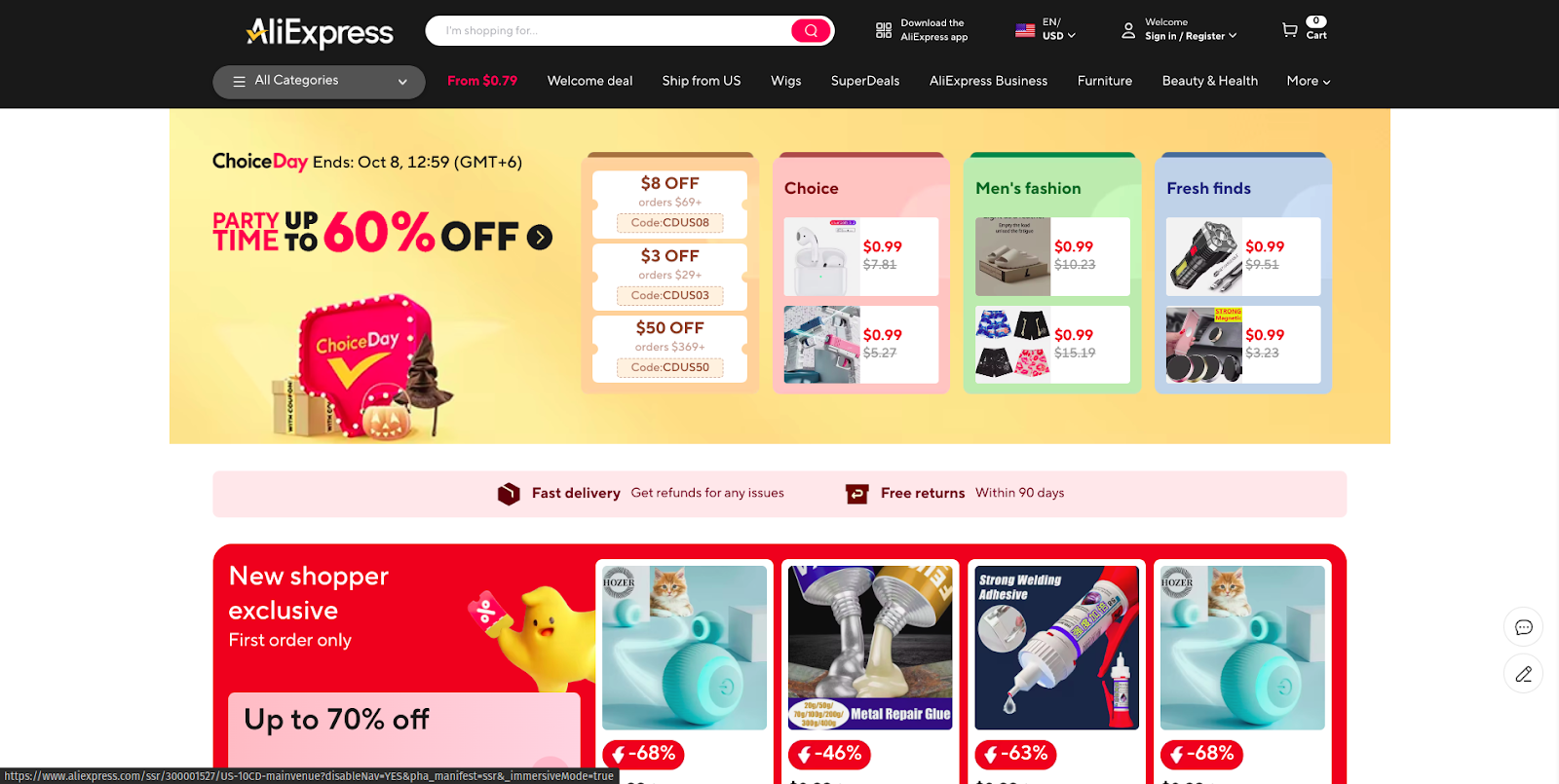
Aliexpress was founded in 2010. This cross-border ecommerce platform is one of the biggest global marketplaces online, driving over 20 million visitors every day. The platform offers a lot of versatility, allowing both businesses and individuals to sell their products.
It has a wide range of product categories, making it great for a broad range of sellers. Its category includes electronics, fashion, home goods, accessories, jewelry, and many more. Any niche you target, you can sell on AliExpress.
They also offer an affiliate program. You'll receive an 8.5% commission on each sale from your link. You have a higher chance of making money, as the site uses cookies that last up to 30 days to track visitors.
If you’re concerned about the fees, AliExpress charges 5% on the lower end and 8% on the higher end on each transaction, depending on the type of product you’re selling. Apart from that, there aren’t any extra costs like dropshipping and setup.
Recommended next read: AliExpress vs Temu: Which is better for sourcing profitable products?
17. MyDeal
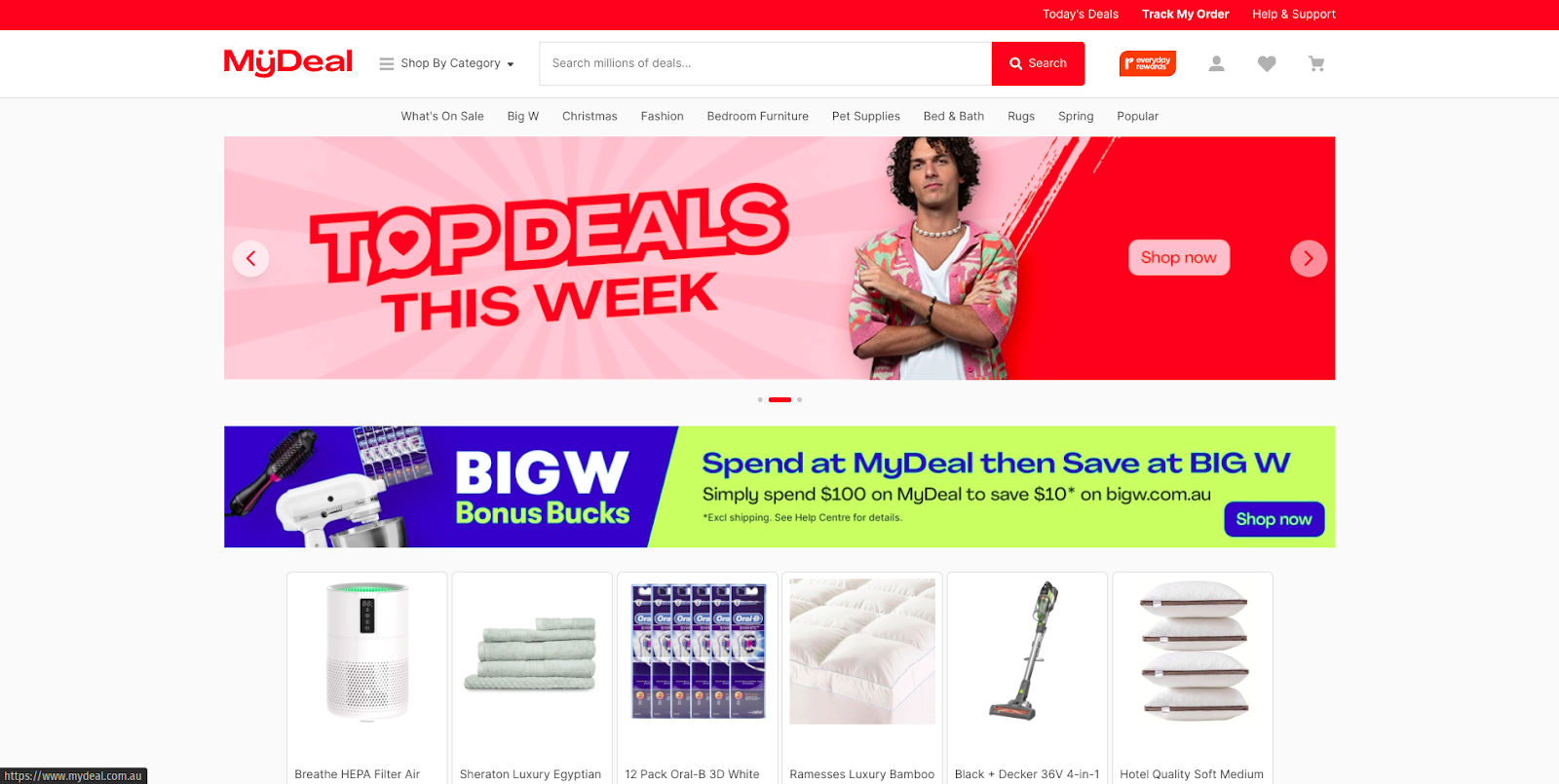
MyDeal is an Australia-based online marketplace that boasts over a million products in 3,500 different categories. It enables third-party sellers to reach a large audience. It drives over 4 million visitors every month.
The platform offers tons of versatility in terms of what type of product you can sell, but some categories do get prioritized more than others. Products like homewares, furniture, and other large products are significantly prominent on MyDeal. So, if that’s the type of product you’re looking to sell, then it’s a great option for you.
One downside of MyDeal is that it doesn’t offer any fulfillment services. Meaning you need to handle your own shipping and order logistics.
18. Poshmark: The best marketplace for clothing
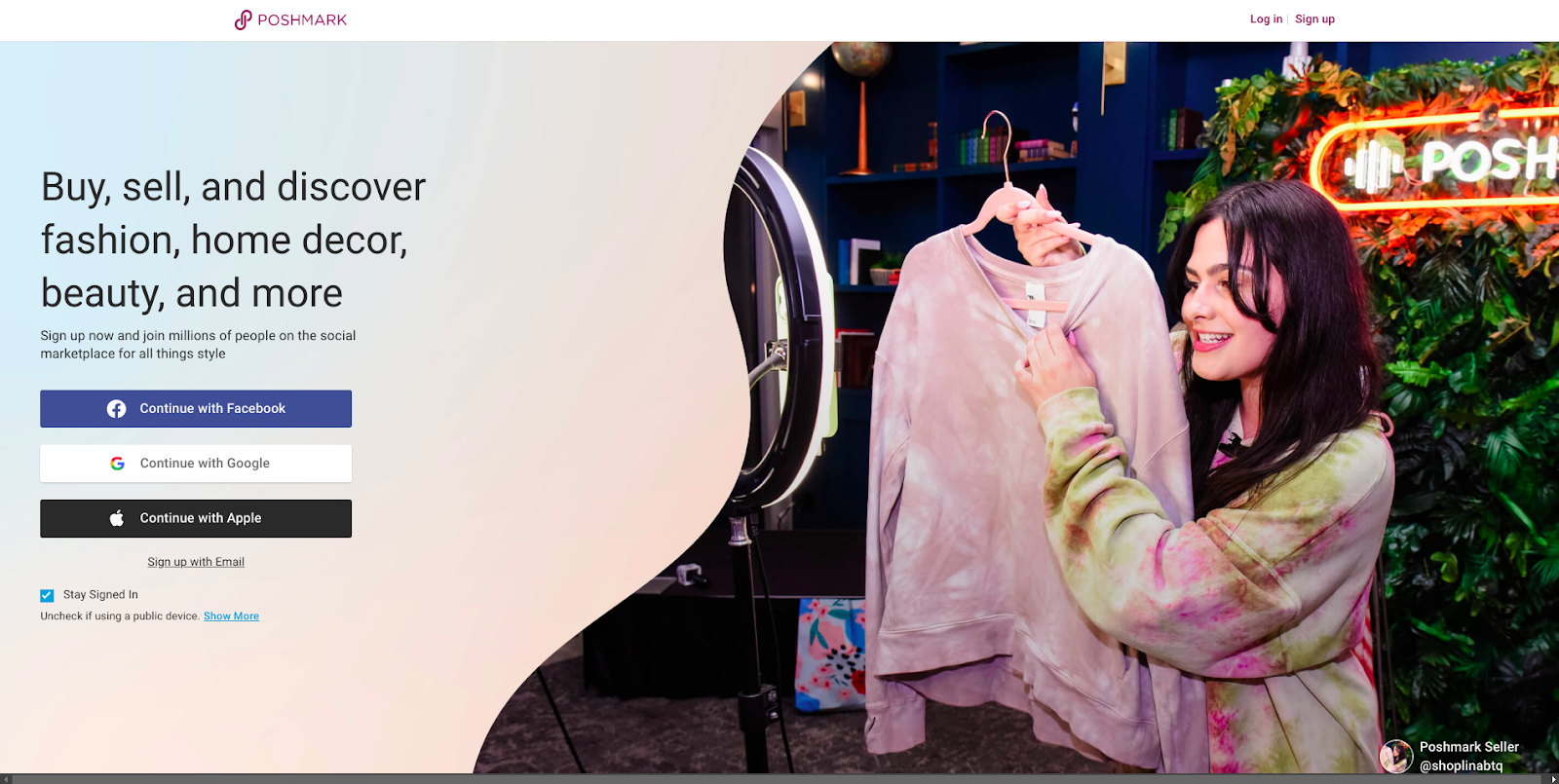
Are you into the clothing business? What are the online selling sites mainly focused on clothing? If that’s what you’re looking for, Poshmark is your answer. It’s one of the most popular online marketplaces for selling clothing and lifestyle accessories. With a massive audience of 80 million users, sellers get access to a massive audience for their products.
Poshmark charges $2.95 for sales under $15 and takes a 20% commission for sales over $15. Their simple pricing is relatively cost-effective compared to their competition.
It has several user-friendly and intuitive tools, along with a supportive community that helps you manage your listings and sell efficiently.
19. Swappa: The best marketplace for gadgets
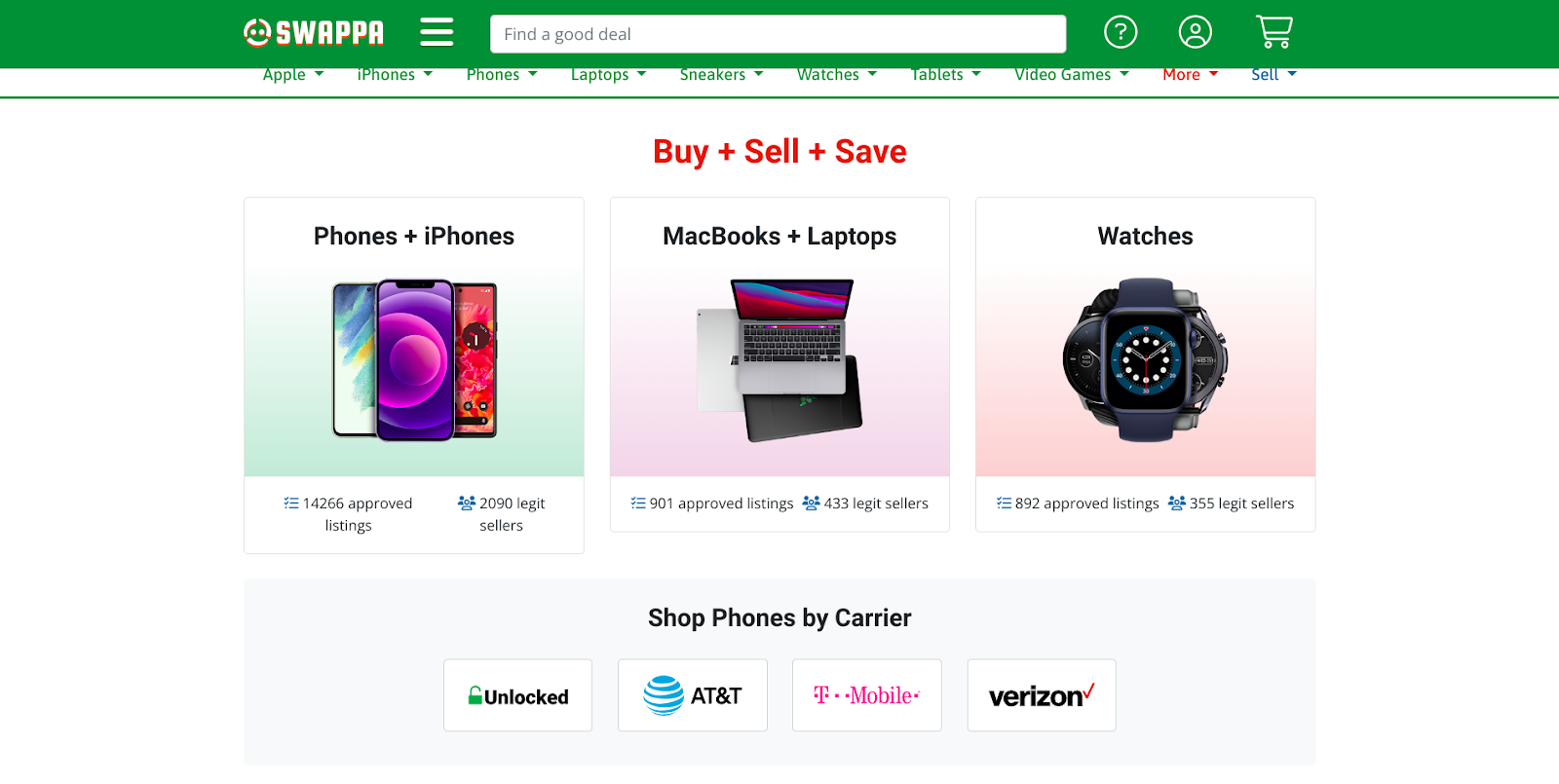
Looking to sell your smartphone? Or any trusted gadgets selling sites online? Then you should take a look at Swappa. They built their extremely strong reputation through getting rid of scammers and trolls. Which means they thoroughly inspect your products. But that shouldn’t be an issue as long as your product is in good working condition.
A great thing about Swappa is that they don’t charge sellers for creating listings. But you can get your listing featured for $5. Swappa has one of the lowest transaction commissions among other marketplaces.
20. Ruby Lane: The best marketplace for vintage/antiques
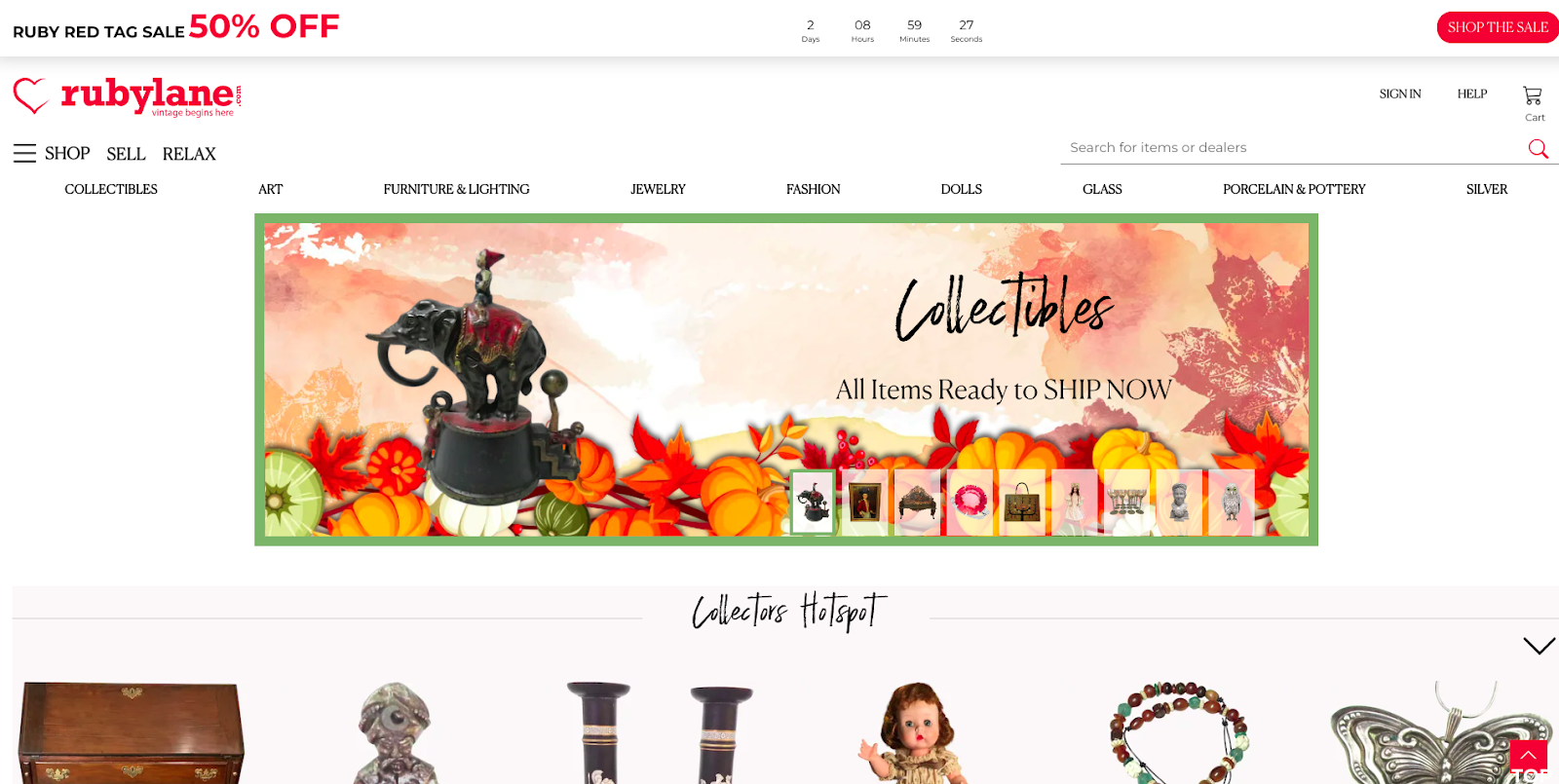
We’ve scoured the internet to find the best marketplace for your cherished antiques, and our research has led us to Ruby Lane.
Ruby Lane is one of the best online selling sites for vintage and antiques. It was also voted the number one site for buying and selling antiques. In 2019, it received the title of “Best site to sell online.”
You don’t have to pay to set up your shop, and the platform doesn’t charge for listings. But if your shop has more than 50 items, you need to pay $54 for maintenance. They also charge a 6.7% service fee on the total order, but it doesn’t include sales tax.
This site was created to bring collecting enthusiasts together. If you’re searching for a niche marketplace to sell your antiques and collectables, then Ruby Lane is the right place for you.
21. BizBuySell: The best marketplace for businesses and entrepreneurs
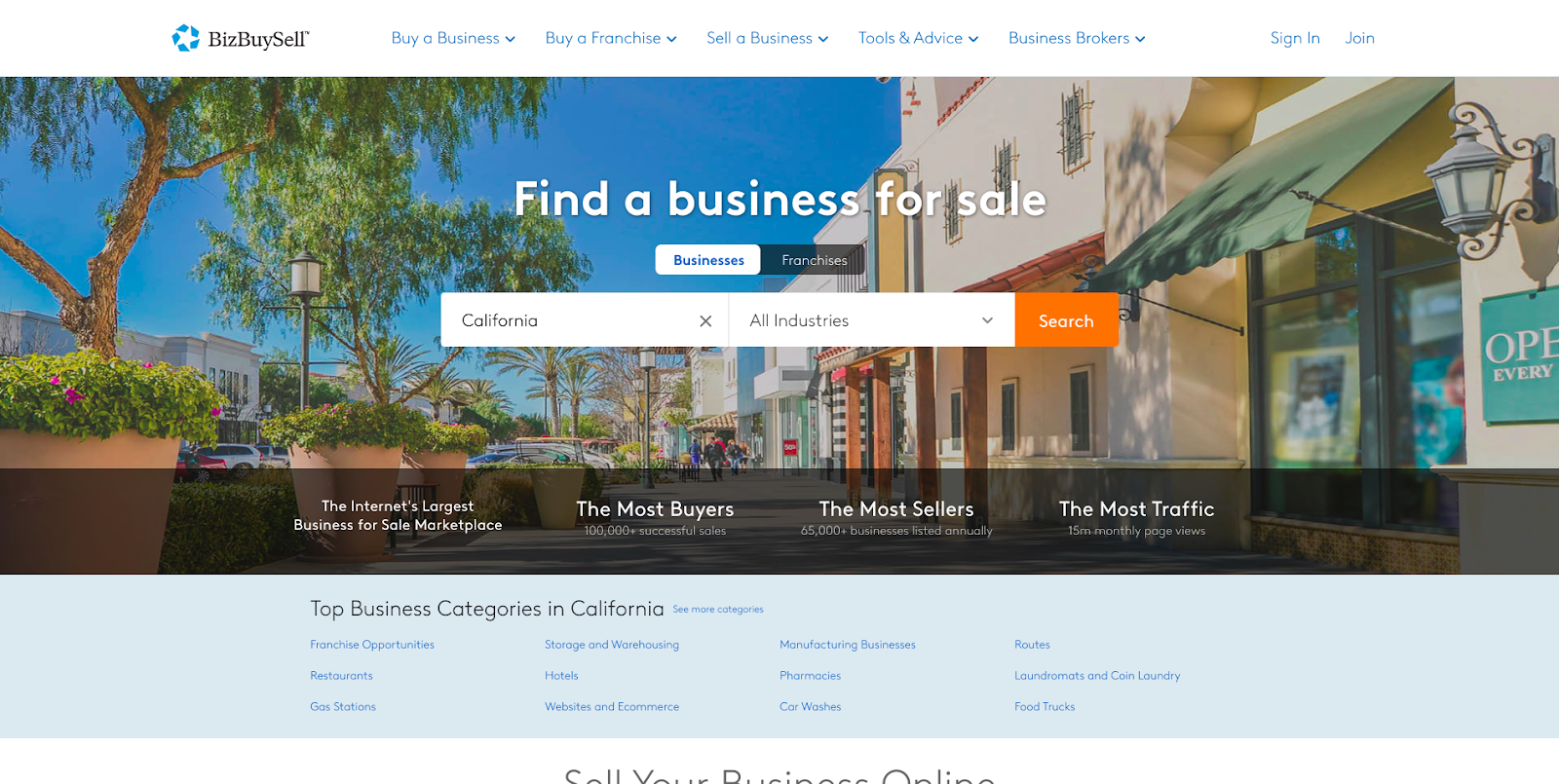
BizBuySell is hands down the most established online marketplace for buying and selling businesses. It has turned into a crucial platform for business owners, entrepreneurs, and brokers.
Founded in 1996, BizBuySell has established a strong brand reputation and has been in the market for over 2 decades. It offers various services, including extensive business listings, a comprehensive broker directory, valuation tools, a resource center, and financing options. It helps you connect with experienced brokers.
You can go for either Basic listings ( $65.95/month), Showcase listings ($89.95/month), or even Diamond Listings ($199.95/month). With the higher listing level comes more advanced features and board exposure. Beside listings, you can also put your ads up for various business assets including licenses, equipment, etc. for closed businesses, lease, or even business real estate.
The platform's relationships with business broker groups and financial institutions enhance its features and broaden its audience. These partnerships give users access to more resources and assistance.
The platform offers a user-friendly, intuitive, and seamless experience for both sellers and buyers. The site lets you search businesses by location, category, and price range. It also offers incredible customer service and access to conversations with professional brokers.
22. AutoTrader: The best marketplace for cars
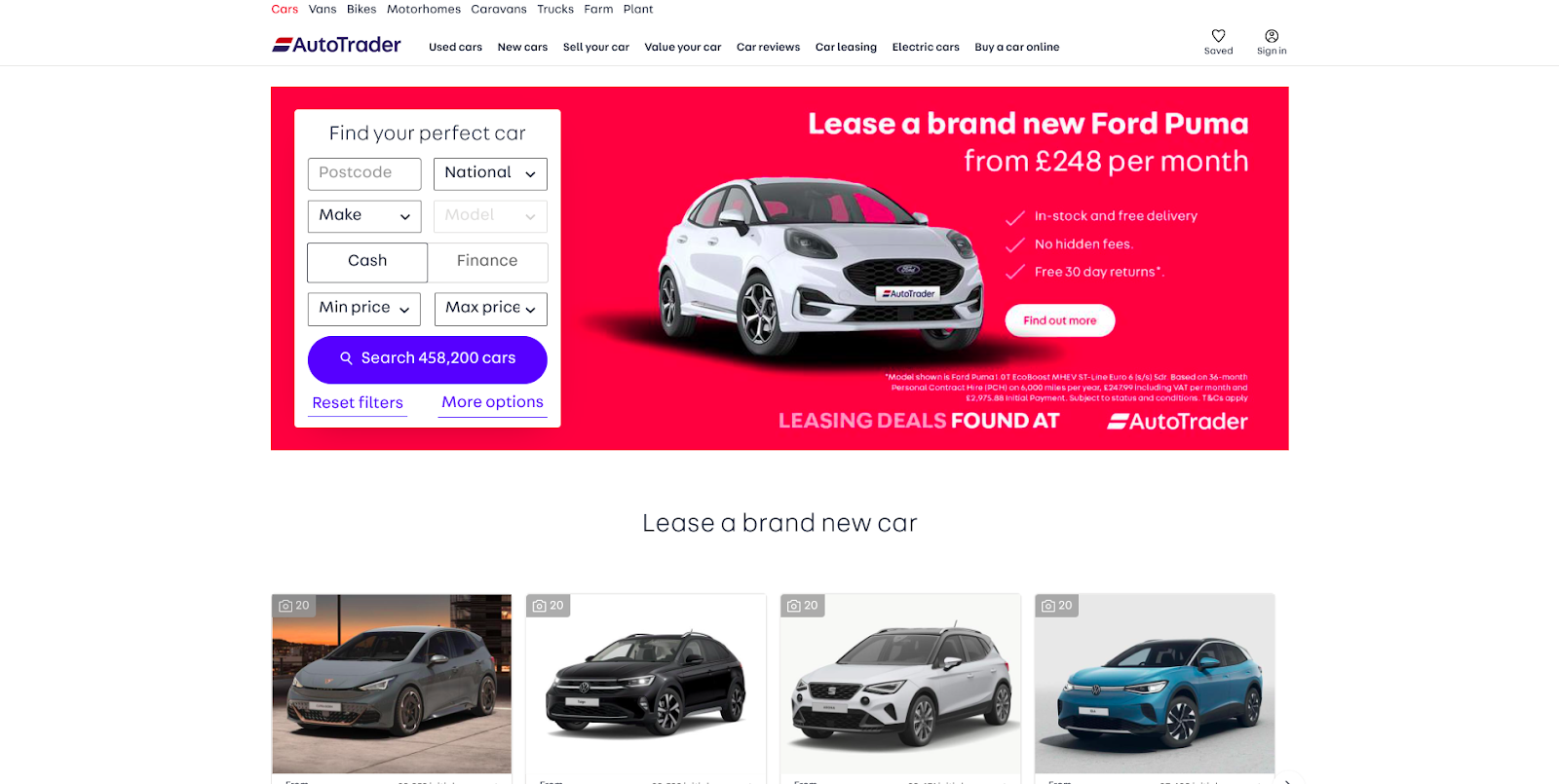
If you’re still googling “What are the best online selling sites for cars?”, your search ends here. AutoTrader is one of the most popular car selling online sites for both sellers and buyers. There are several reasons behind it. The platform offers advanced search tools that help buyers easily find what they’re looking for.
You only need to pay a one-time fee of $49 for listings. Since their listing package options offer the seller a money-back guarantee, you don’t get charged if you don’t make a sale.
Another great thing about AutoTrader is that it allows you to sell a car to a dealership and receive an instant cash offer. It’s the best car-selling site if you’re looking to sell your car as soon as possible and make as much profit as possible.
23. Farfetch: The best marketplace for luxury products
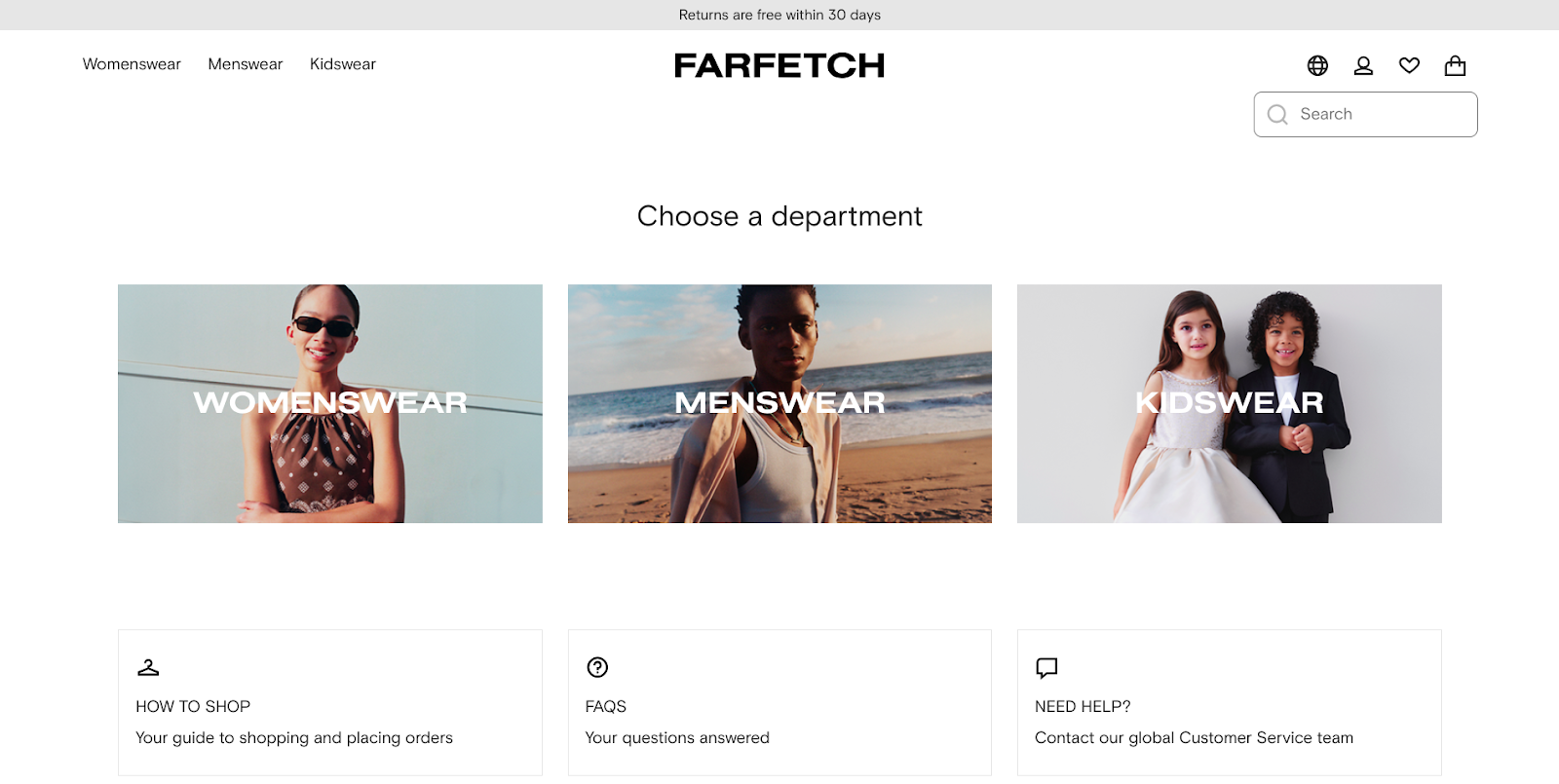
Fafetch is one of the biggest global market platforms for luxury fashion products, with over 3,000 brands and boutiques and millions of customers in 190 countries.
It offers a handpicked selection of pre-owned and new clothes, accessories, shoes, bags, jewelry, and other luxury goods from top brands, including Gucci, Burberry, Balenciaga, Prada, and more.
Farfetch offers a range of services for buyers and sellers, like authentication, delivery returns, personal styling, and customer care. It also integrates with e-tailize, enabling you to easily manage your orders, inventory, and campaigns across multiple channels.
Why should you consider selling on online marketplaces?
Online marketplaces offer you access to a massive pool of new potential customers. One of the main benefits of online marketplaces is that they enable you to take advantage of the marketplace's vast resources and networks without making a huge operations investment.
This is one of the key reasons marketplaces continue to grow, even through the rough few years of the ecommerce industry. Customers love the sheer convenience and the massive number of choices on these platforms.
Here are a few benefits of selling through an online marketplace:
Increased visibility and sale potential
Sellers hugely benefit from the marketplace’s brand recognition and visibility. This attracts a massive pool of potential customers, offering sellers exposure to a wider range of audiences, which would be harder to achieve with individual marketing efforts.
Instead of just listing your products on your website, adding them to a marketplace will provide them with more exposure to buyers in the marketplace rather than just your regular customers.
Online marketplaces are also incredibly convenient for your sales. Most customers will already have an account, so you’re relieved from the hassle of entering their data into your site.
Low barrier to entry
Joining an online marketplace is almost always more cost-effective compared to building your online store. You can leverage the marketplace’s existing customer base and infrastructure to save money on website development, hosting, and maintenance costs. This can significantly increase your margin of profit.
Marketplaces also offer you a platform to scale your operations without needing significant investments in additional infrastructure. You can focus on expanding your product range and enhancing customer satisfaction. This will help you scale your business significantly.
Marketing support
Marketing is essential for establishing your brand and products. Many companies invest a significant portion of their budget in marketing activities to drive traffic to their sites. Marketplaces aren’t an exception. They invest a lot of money in marketing their platforms.
You can use their brand recognition to help you promote your products and get a hold of a wide audience.
Trust and credibility
One of the biggest advantages of selling your products on an online marketplace is the trust and credibility that the marketplace offers to its sellers and buyers. Receiving a good rating in the marketplace also benefits your site, as trusted platforms can give you a boost, helping you stand out from your competition.
Effortless transactions
Marketplaces handle all the transactional processing, order fulfillment, and payment gateways. This allows you to focus on product development and improving your customer service without getting overwhelmed by the technical aspects of ecommerce.
Global opportunities
Another huge advantage of online marketplaces is the ability to tap into a global audience. With marketplaces like eBay holding a wide global market share, you can reach into international markets and expand your customer base without any hassle. This can lead to substantial growth opportunities and increased profits, as you’re not bound by geographical restrictions.
Apart from traditional marketplaces, sellers can take advantage of specialized platforms like the Facebook marketplace to target specific regions. Most platforms take care of the shipping and payment process on their end, so you can enjoy the benefits of an international business without bearing the complicated processes.
5 best practices for selling with an online marketplace
Online marketplaces are an ever-changing place to do business. So, you need to make sure you’re on the best courses to make the most out of your journey. Here are 5 best practices you can follow:
1. Make it customer-centric
Customers want a transparent, convenient, and personalized shopping experience that’s worth their time and money. However, focusing on the customer doesn’t mean it doesn’t benefit the seller.
Developing more meaningful interactions with your customers in a marketplace has a direct impact on your sales and revenue. Regularly engaging with your customers can improve their customer sentiment and create a loyal customer base in the long run.
Recommended next read: Keeping customers happy
2. Keep accurate inventory
Keeping track of your stocks and syncing your inventories to the marketplace regularly is essential to avoid overselling. Overselling happens when a customer can successfully place an order for a product that you’re out of stock.
If that happens, you need to cancel their order, which gives the customer a negative shopping experience. Moreover, overselling too much can also result in your marketplace account being suspended.
3. Maintain precise product details
In online shopping, product images have a massive impact on the customer's purchase decisions. Learn the marketplace’s image requirements so you can list your items.
Most large marketplaces require you to upload high-resolution images of the product with a white background. Also, keep in mind that most large marketplaces don’t accept markups, graphics, line sheets, or watermarks on the images.
Extra images of the product showcasing it from different angles are also great for increasing visual appeal. Larger images allow you to show more details and highlight effectiveness, which boosts your sales chances. Lifestyle images showing the product in use can also drive sales, as the customer gets an idea of the value it might add to their life.
4. Set a decent and competitive price for the product
Online marketplaces vary quite a bit from standard ecommerce. While some prioritize moving large stocks of products fast, others focus on high-end niche products with a small audience willing to wait for a while for custom orders.
In online marketplaces, pricing your products just right is an important step, as it's a highly competitive market where customers will only choose the best deal. But even with the right and competitive price, it might take you a while to see a successful sale.
Recommended next read: 12 ecommerce pricing strategies used by the experts
5. Plan ahead
Planning is another critical step before you start listing your products on a marketplace. You can’t just start selling massive volumes of products when you’re starting out. So you need to plan ahead how you’re going to handle stocks and orders. This is also crucial so you don’t oversell or underestimate your orders.
Is using an online marketplace worth it?
It’s true that ecommerce and online shopping have become an integral part of our lives, but before considering doing it professionally, you must have a clear understanding of what comes with it.
Pros:
- Marketplaces help you get greater visibility and reach a broad range of customers. As these platforms already cater to a huge client base, you’ll have a good starting and won’t have to put extra effort into expanding your reach.
- You can build a trusting relationship with your clients and get yourself a loyal client base selling on online marketplaces. As you get to efficiently manage their products and give them a smooth experience with your shop, you build transparency and credibility over time. The trust associated with the marketplace platform plays a great role in trusting your business, and customers generally aren’t hesitant to share their payment details, even if yours’ is a fairly new operation.
- Since these platforms have bigger teams managing different technical sectors, these marketplaces run smoothly and don’t easily crash even though thousands of people are ordering and browsing products at the same time. So you don’t have to worry about dealing with the tech stuff and spending money on this if something goes wrong.
- With the platforms’ impeccable management, including delivery, shipping, and after-sales services, you can provide great customer service at no additional cost.
Cons:
- One of the most unavoidable problems in these marketplaces is cutthroat competition. Thousands of other people will have the same products as you, and they’ll be shown beside yours. So you can imagine the competition, especially since it’s going to be very challenging to beat the discounts offered by established businesses.
- Unlike physical stores, you can’t receive payments immediately once you ship the product. The payment follows a lengthy process before reaching you. The marketplace gets the payment first, then all the service fees are deducted, and then it reaches you, which again can still take up to several days.
- Unless you make it big and have a very strong client base, ads are the fuel to running your marketplace successfully. So, expect to set aside a decent amount of money to promote your products while running social media ads to get adequate and targeted exposure.
- Marketplaces charge comparatively decent to high commission fees, which can range from 20% to 40%. While this might not be a big deal for larger operations, if yours is just starting out, you’ll find it hard to make a profit. This is especially true if you're selling physical products and have to invest money in inventory.
Weighing all the cons, the traditional marketplaces don’t seem to offer justified returns. You need an all-in-one marketplace that puts you first.
Sell your digital products and services with Whop

Selling digital products online is a great business idea full of potential, and Whop is here to help.
You can create your very own whop, which is your own personal online hub to host your digital content and grow an audience to sell your products. Your whop comes with robust, user-friendly, native apps, making it easy to set up in just minutes and start selling straight away. So Whop isn't just another marketplace - it is a social commerce platform where you can create, market, and grow your business.
Joining Whop gives you access to:
- User-friendly dashboard
- Zero monthly subscription fees
- Payment system with a wide range of payment integrations
- Incredible 24/7 customer care
Whop offers all these incredible features and more. So, join Whop today and embark on your business journey.
FAQs
How do I get started with selling online?
- Choose an ecommerce platform and create your online account
- Become a seller on a large online marketplace like Etsy, Amazon, and eBay, or become an individual seller
- Sell on social media platforms such as Instagram and Facebook
- Start a dropshipping business
- Resale of pre-owned products on sites like Decluttr
Which marketplace has the most traffic?
Amazon is the most visited online marketplace website, with an average of 4.8 billion monthly visitors. It’s also the top-selling online marketplace in the US and UK.
Which items are the most popular and best-selling on the online marketplace?
The most sold types of products in online marketplaces based on Shopify’s market data include:
- Health Supplements
- Pet care products
- Skincare products
- Makeup
- Bicycles
- Drinkware
- Cookware
- Fitness equipment
- Art supplies
- Clothing
- Jewelry
What are the top online apparel-selling sites?
The best-known online clothing-selling sites include Etsy, Poshmark, Ruby Lane, and Facebook Marketplace. While each differs in costs and charges, they all have a strong and reliable brand image.
What are some leading online marketplaces for individual sellers?
The top online selling sites for individual sellers include Charish, Bonanza, and VarageSale. They all have a strong community of entrepreneurs and a loyal customer base that keeps businesses running.

